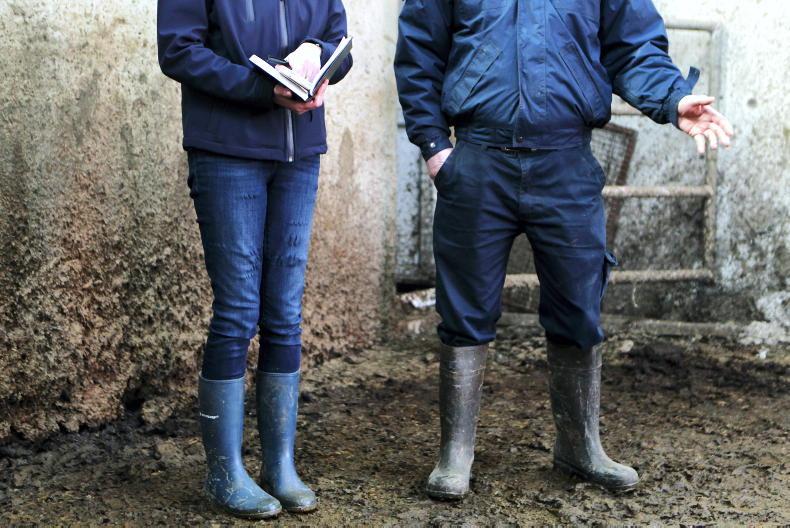Bord Bia is planning to launch an updated digitally based farm audit system for farmer quality assurance schemes in June 2024.
The new sustainability digital platform, developed in conjunction with Teagasc and the Irish Cattle Breeding Federation (ICBF), will gather farmer data from a range of agencies and bodies that some farmers already share information with.
The Department of Agriculture is to act as a central host of this information, with cattle weight data to be supplied by the ICBF, milk data from dairy co-ops and other farm details to come from a survey participating farmers are to complete ahead of their farm audit.
Central to the revamped auditing regime will be completion of a sustainability action plan on farm every 18 months. The plan will determine each farm’s emissions and set out actions a farmer can take to reduce them. It is not yet clear whether a farmer’s quality assurance membership will be dependent on whether they complete all actions in the sustainability action plan.
The Department’s new Suckler Carbon Efficiency Programme (SCEP), a successor to the BDGP scheme, will require farmers to be members of Bord Bia’s beef quality assurance scheme to draw down payments from 2023.
Bord Bia is aiming to pass 50,000 farmers through the platform by 2030, the agency’s head of meat, food and beverages John Murray told vets attending the Cattle Association of Veterinary Ireland (CAVI) conference last Wednesday.
Pilot schemes
The audit regime will be piloted on Teagasc Signpost programme demonstration farms from November 2023, before being rolled out across all Bord Bia farmer scheme members.
Around 100 farmers – mostly Teagasc Signpost programme participants – have already trialled the animal welfare audit checks. Bord Bia reports that these farmers have responded positively to this new element of the audit and are keen to adhere to higher animal welfare standards.
Sustainability Action Plan measures
The Irish Farmers Journal understands that farmers could be directed, in the sustainability action plan they receive, to implement measures such as clover inclusion in grass swards, soil testing and correcting sub-optimal soil fertility.
There is no indication that farmers would receive any funding towards the cost of these measures.
Data sharing
Receiving farmers’ agreement to access data from the various bodies and agencies involved will be essential to the rollout, according to Murray.
Permission will need to be given by farmers before this data can be accessed by Bord Bia.
“Obviously, we are looking to take a lot of farmer data and bring that all together – with that comes a lot of GDPR issues and comes a lot of access issues,” Murray said.

The changes will speed up the farm visit element of audits, Bord Bia maintains.
“What is going to be really important is that we have farmer permission to do that and that all of the different agencies are working together on that.”
Animal welfare checks: flightiness, behaviour and coat condition
Bord Bia’s new audit will include animal welfare checks that will include: auditors seeing how close they can get to housed cattle without the animals turning away; checking whether cattle are holding their head up or down, and coat condition checks.
“Over the last couple of months, we have been running a pilot on this to really build out a roadmap for when it can be done, when it could be consistently audited and whether we can be able to get that independently verified – and we can,” commented Murray.
“This is going to be part of the new producers’ scheme in 2024 and it will focus on a couple of key areas – pain management, housing and space allowance, nutrition management.”
Bord Bia has already flagged some potential issues for farmers on its new animal welfare audits.
It says that some issues are anticipated around space requirements for housed animals and pain relief, based on the findings of its pilot welfare checks.
It expects that the barriers to the implementation of best practice in pain relief are expected to relate to time issues for farmers, rather than the cost.
“There are some challenges coming up. We can see some challenges around housing allowance and pain management,” the conference heard.
Audit benefits
Bord Bia has said that the new system will shorten the time taken to complete audits on mixed-species farms. It is unclear whether this relates to the time spent by a Bord Bia auditor on the farm, or the farmer’s time preparing for audit and enacting the required measures.
Bord Bia says the new system will also allow for more consistent auditing across farms and allow Bord Bia to respond quicker to changing market requirements.
Murray said these changes, particularly new animal welfare-focused checks, will benefit Irish exports’ standing among buyers overseas.
“This stuff resonates with people and customers, especially on the continent. It’s important that we build that out over the course of the next 12 months,” he explained. He did not mention whether farmers could or should expect any benefit in the form of a higher quality assurance bonuses or other financial incentives.
Optional
add-on checks
Farmers can pick from a range of optional add-on areas of auditing, should they wish to be inspected on them, John Murray told the CAVI conference.
“These are things that, in tandem with your processor or your co-op, you may want to do something specific around grain finishing [of animals] or around seaweed rations or around straw bedding,” Murray said.
Bord Bia is planning to launch an updated digitally based farm audit system for farmer quality assurance schemes in June 2024.
The new sustainability digital platform, developed in conjunction with Teagasc and the Irish Cattle Breeding Federation (ICBF), will gather farmer data from a range of agencies and bodies that some farmers already share information with.
The Department of Agriculture is to act as a central host of this information, with cattle weight data to be supplied by the ICBF, milk data from dairy co-ops and other farm details to come from a survey participating farmers are to complete ahead of their farm audit.
Central to the revamped auditing regime will be completion of a sustainability action plan on farm every 18 months. The plan will determine each farm’s emissions and set out actions a farmer can take to reduce them. It is not yet clear whether a farmer’s quality assurance membership will be dependent on whether they complete all actions in the sustainability action plan.
The Department’s new Suckler Carbon Efficiency Programme (SCEP), a successor to the BDGP scheme, will require farmers to be members of Bord Bia’s beef quality assurance scheme to draw down payments from 2023.
Bord Bia is aiming to pass 50,000 farmers through the platform by 2030, the agency’s head of meat, food and beverages John Murray told vets attending the Cattle Association of Veterinary Ireland (CAVI) conference last Wednesday.
Pilot schemes
The audit regime will be piloted on Teagasc Signpost programme demonstration farms from November 2023, before being rolled out across all Bord Bia farmer scheme members.
Around 100 farmers – mostly Teagasc Signpost programme participants – have already trialled the animal welfare audit checks. Bord Bia reports that these farmers have responded positively to this new element of the audit and are keen to adhere to higher animal welfare standards.
Sustainability Action Plan measures
The Irish Farmers Journal understands that farmers could be directed, in the sustainability action plan they receive, to implement measures such as clover inclusion in grass swards, soil testing and correcting sub-optimal soil fertility.
There is no indication that farmers would receive any funding towards the cost of these measures.
Data sharing
Receiving farmers’ agreement to access data from the various bodies and agencies involved will be essential to the rollout, according to Murray.
Permission will need to be given by farmers before this data can be accessed by Bord Bia.
“Obviously, we are looking to take a lot of farmer data and bring that all together – with that comes a lot of GDPR issues and comes a lot of access issues,” Murray said.

The changes will speed up the farm visit element of audits, Bord Bia maintains.
“What is going to be really important is that we have farmer permission to do that and that all of the different agencies are working together on that.”
Animal welfare checks: flightiness, behaviour and coat condition
Bord Bia’s new audit will include animal welfare checks that will include: auditors seeing how close they can get to housed cattle without the animals turning away; checking whether cattle are holding their head up or down, and coat condition checks.
“Over the last couple of months, we have been running a pilot on this to really build out a roadmap for when it can be done, when it could be consistently audited and whether we can be able to get that independently verified – and we can,” commented Murray.
“This is going to be part of the new producers’ scheme in 2024 and it will focus on a couple of key areas – pain management, housing and space allowance, nutrition management.”
Bord Bia has already flagged some potential issues for farmers on its new animal welfare audits.
It says that some issues are anticipated around space requirements for housed animals and pain relief, based on the findings of its pilot welfare checks.
It expects that the barriers to the implementation of best practice in pain relief are expected to relate to time issues for farmers, rather than the cost.
“There are some challenges coming up. We can see some challenges around housing allowance and pain management,” the conference heard.
Audit benefits
Bord Bia has said that the new system will shorten the time taken to complete audits on mixed-species farms. It is unclear whether this relates to the time spent by a Bord Bia auditor on the farm, or the farmer’s time preparing for audit and enacting the required measures.
Bord Bia says the new system will also allow for more consistent auditing across farms and allow Bord Bia to respond quicker to changing market requirements.
Murray said these changes, particularly new animal welfare-focused checks, will benefit Irish exports’ standing among buyers overseas.
“This stuff resonates with people and customers, especially on the continent. It’s important that we build that out over the course of the next 12 months,” he explained. He did not mention whether farmers could or should expect any benefit in the form of a higher quality assurance bonuses or other financial incentives.
Optional
add-on checks
Farmers can pick from a range of optional add-on areas of auditing, should they wish to be inspected on them, John Murray told the CAVI conference.
“These are things that, in tandem with your processor or your co-op, you may want to do something specific around grain finishing [of animals] or around seaweed rations or around straw bedding,” Murray said.










SHARING OPTIONS